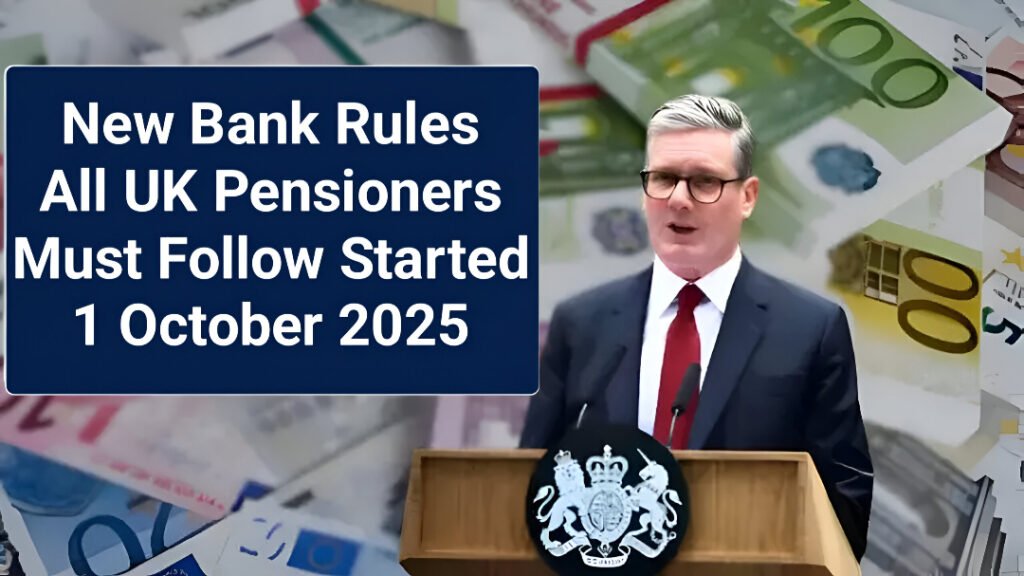Hello Everyone, From 1 October 2025, the Department for Work and Pensions (DWP) has introduced new banking rules that directly affect all pensioners across the UK. These changes are designed to improve security, prevent fraud, and ensure that pension payments reach the correct recipients on time. Every pensioner, whether receiving a State Pension or other retirement-related benefits, must be aware of these rules to avoid interruptions in their payments.
The update has already sparked nationwide discussions, as many elderly citizens rely solely on their pension for daily expenses. The DWP has reassured pensioners that the rules are straightforward, but it is crucial for everyone to understand what is required. Let us break down the most important aspects of these new regulations.
Why the Rules Have Changed
The DWP regularly reviews its payment system to keep up with modern banking standards. With rising concerns about financial scams targeting pensioners, stricter verification measures were necessary. The government wants to ensure that pension money goes into the right hands and is not misused through fraudulent bank accounts.
Another key reason behind the changes is to streamline the banking process. By aligning pension payments with updated banking protocols, the DWP aims to make transactions faster and more transparent. Pensioners who keep their bank information up-to-date will face fewer issues, ensuring smooth monthly payments.
Key Bank Requirements for Pensioners
From October 2025, pensioners must confirm that their bank details are current and registered under their name. Shared or outdated accounts may no longer be acceptable in some cases. This ensures full compliance with anti-fraud policies.
Additionally, pensioners will need to respond to verification requests from either their bank or the DWP. These may include proof of identity, recent statements, or digital confirmations via secure banking apps. Failing to complete verification may cause delays or temporary holds on pension payments.
How to Update Your Bank Details
Updating bank details with the DWP is a simple process, but it must be done carefully to avoid errors. Pensioners can either log in to their official DWP online account or contact the helpline to provide updated information. Those who prefer offline options can also submit forms via post or visit local support centres.
When submitting changes, pensioners must double-check account numbers, sort codes, and the name registered with the bank. Even small mistakes can lead to payment disruptions. The DWP recommends updating details well in advance to ensure no pension payment is missed.
Impact on Pension Payments
These changes will not affect the amount pensioners receive but may impact how and when payments are processed. Pensioners who fail to comply with the new rules might see delays in their funds being credited. Banks will now have stronger verification checks before releasing payments from the DWP.
It is also important to note that joint accounts may require extra verification steps. In such cases, pensioners should be prepared to provide additional documentation proving ownership. By ensuring compliance, pensioners can continue to receive their pensions without any disruption.
Extra Support for Vulnerable Pensioners
The DWP recognises that some elderly citizens may struggle with technology or paperwork. Special assistance has been set up for vulnerable pensioners who cannot manage updates on their own. Carers, guardians, or trusted family members can step in to support with consent.
Furthermore, local councils and community centres will host awareness sessions, guiding pensioners on how to follow the new rules. For those without internet access, dedicated phone lines and postal options are available. The goal is to ensure that no pensioner is left behind during this transition.
Security Benefits of the New Rules
-
Stronger fraud protection for pensioners’ accounts.
-
Real-time verification to prevent unauthorised access.
-
Greater transparency between the DWP and banks.
-
Faster resolution in case of account errors or fraud.
These benefits highlight the government’s intention to protect pensioners from common scams. With financial crime targeting older age groups on the rise, these measures are timely and much needed.
What Pensioners Should Do Now
-
Check your current bank details are correct and active.
-
Update your information with the DWP if anything has changed.
-
Respond quickly to any verification requests.
-
Seek help if you face difficulties with online systems.
By following these simple steps, pensioners can ensure they remain fully compliant and experience no delays in their monthly pension payments.
FAQs on DWP Pension Update
Q1. Do I need to open a new bank account for my pension?
No, pensioners do not need a new account if their current one is valid and in their name. You only need to update if your details are outdated or linked incorrectly.
Q2. What happens if I do not update my bank details?
If your details are incorrect or unverified, your pension payment could be delayed or temporarily stopped until verification is complete.
Q3. Can I use a joint account for pension payments?
Yes, but you may need to provide extra verification to prove your ownership. The DWP prefers payments into accounts where the pensioner is a named holder.
Q4. How can vulnerable pensioners get help with these updates?
Carers, family members, or authorised representatives can assist with consent. Local councils and DWP support lines also provide guidance.
Q5. Will these rules affect the pension amount I receive?
No, the payment amount remains unchanged. The update only affects how payments are processed and verified.
Final Thoughts
The DWP pension update that began on 1 October 2025 is one of the most important banking changes in recent years for UK pensioners. While the process may feel overwhelming for some, the aim is to provide stronger financial protection and prevent fraud. By taking simple steps like verifying details and keeping information updated, pensioners can ensure hassle-free payments every month. The message is clear: stay informed, stay secure, and comply with the rules to protect your pension income.
